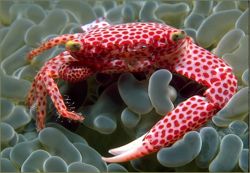Science Note/Crustaceans in the Reef
Air Date: Week of February 25, 2011

A Coral Crab. (Photo: Jeffrey N. Jeffords - Divegallery)
Researchers discover that crustaceans are able to detect and respond to the sounds of the coral reef. The study highlights how important ocean acoustics are to sea creatures, and how noise pollution from our ships could have a major impact on marine ecosystems. Sean Faulk reports.
Transcript
GELLERMAN: Coming up: a visit to one of the world's most extreme deserts - but first this note on emerging science from Sean Faulk.
[SOUNDS OF A CORAL REEF]
FAULK: A coral reef is a noisy place, filled with sounds of clicking fish and snapping shrimp. That's important for reef-dwelling fish who head towards the noise to find their way back home.
[SCIENCE NOTE THEME]

A Coral Crab. (Photo: Jeffrey N. Jeffords - Divegallery)
FAULK: Now, researchers at Bristol University in the UK think reef noise is also important for crustaceans like shrimp, crabs, and lobsters - creatures previously thought to be deaf. Marine biologists collected almost 700,000 crustaceans from the Great Barrier Reef and put them into a large pool. They set up an underwater sound system that streamed a recording of a coral reef and what they saw surprised them.
Crustaceans like crabs and lobsters that live in reefs scuttled towards the noise, while others, those that eat plankton and have predators in reefs, scurried away. The scientists say their study highlights how important ocean acoustics are to sea creatures and how noise pollution from our ships could disrupt marine ecosystems.
A recent study showed that in the last 50 years, man-made noise in the ocean has increased a hundredfold. If we continue at that rate, our industrial noises may drown out the chirps and snaps that make up the chorus of the coral reef.
[SOUND OF THE CORAL REEF]
FAULK: That's this week's Note on Emerging Science, I'm Sean Faulk.
[SCIENCE NOTE THEME]
Living on Earth wants to hear from you!
Living on Earth
62 Calef Highway, Suite 212
Lee, NH 03861
Telephone: 617-287-4121
E-mail: comments@loe.org
Newsletter [Click here]
Donate to Living on Earth!
Living on Earth is an independent media program and relies entirely on contributions from listeners and institutions supporting public service. Please donate now to preserve an independent environmental voice.
NewsletterLiving on Earth offers a weekly delivery of the show's rundown to your mailbox. Sign up for our newsletter today!
 Sailors For The Sea: Be the change you want to sea.
Sailors For The Sea: Be the change you want to sea.
 The Grantham Foundation for the Protection of the Environment: Committed to protecting and improving the health of the global environment.
The Grantham Foundation for the Protection of the Environment: Committed to protecting and improving the health of the global environment.
 Contribute to Living on Earth and receive, as our gift to you, an archival print of one of Mark Seth Lender's extraordinary wildlife photographs. Follow the link to see Mark's current collection of photographs.
Contribute to Living on Earth and receive, as our gift to you, an archival print of one of Mark Seth Lender's extraordinary wildlife photographs. Follow the link to see Mark's current collection of photographs.
 Buy a signed copy of Mark Seth Lender's book Smeagull the Seagull & support Living on Earth
Buy a signed copy of Mark Seth Lender's book Smeagull the Seagull & support Living on Earth

